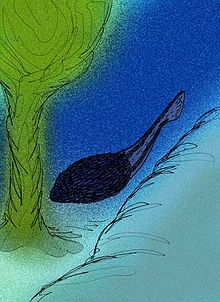Traquairaspidiformes is an order of extinct heterostracan agnathan fish known from the Silurian and Early Devonian periods. Fossils are predominantly known from Late Silurian fluvial deposits from Wales and England: some species were also found in strata representing shallow water marine environment in Canada and North America.[1]
| Traquairaspidiformes Temporal range:
| |
|---|---|

| |
| Reconstruction of T. cambelli | |
| Scientific classification | |
| Domain: | Eukaryota |
| Kingdom: | Animalia |
| Phylum: | Chordata |
| Infraphylum: | Agnatha |
| Class: | †Pteraspidomorphi |
| Subclass: | †Heterostraci |
| Order: | †Traquairaspidiformes Tarlo, 1962 |
| Families | |
| |
| Synonyms | |
| |

The head-shield and body armor of most traquairaspids form an almond shape. Plates have a distinctive ornamentation of tubercles: this ornamentation is very similar to the plate ornamentation of the heterostracan Weigeltaspis. This similarity of ornamentation creates much confusion over the taxonomical placement of Weigeltaspis, in addition to confusion over whether or not an isolated plate is of Traquairaspis, or of Weigeltaspis. Intact specimens of Weigeltaspis suggest a living animal similar to psammosteids like Drepanaspis.[2] The armor of Phialaspis symmondsi (once considered as species of Traquairaspis[3]) is shaped like a jet plane or paper airplane, with pointed wing-like crests and a dorsal crest near the posterior end of the armor. The body of "Yukonaspis," Traquairaspis angusta, is greatly elongated, based on the holotype, a ventral plate.
Most species of traquairaspids are placed within the type genus Traquairaspis; most of the other genera, such as Phialaspis, Toombsaspis, and "Yukonaspis," have been synonymized into Traquairaspis. Weigeltaspis is sometimes placed within Traquairaspidiformes on account of the plate ornamentation being almost identical to that of Traquairaspis.
Taxonomy
edit- Family Phialaspididae White 1946
- Genus Munchoaspis Tarrant 1991
- Genus Phialaspis Wills 1935
- Genus Toombsaspis Tarrant 1991
- Family Traquairaspididae Kiær 1932 corrig.
- Genus Pseudotraquairaspis Broad 1968
- Genus Rimasventeraspis Tarrant 1991 [Yukonaspis Obručhev 1964 non Kobayashi 1936 non Stensiö 1964]
- Genus Traquairaspis Kiær 1932 [Orthaspis Brotzen 1934; Lophaspis Brotzen 1934 non Redtenbacher 1895; Lophaspiscis Whitley 1951]
- ?Family Weigeltaspididae Brotzen 1933/Tarlo 1962
- ?Genus Weigeltaspis Brotzen 1933
References
edit- ^ Dineley, DL (1964). "New specimens of Traquairaspis from Canada". Palaeontology. 7 (2): 210–219. "Archived copy" (PDF). Archived from the original (PDF) on 2012-04-25. Retrieved 2015-07-19.
{{cite web}}: CS1 maint: archived copy as title (link) - ^ Tarlo, Halstead. "LB t1965) Psammosteiformes tAgnatha)—A review with descriptions of new material from the Lower Devonian of Poland, II. Systematic Part." Palaeontologia Polonica 15: 168. Pages 20-21
- ^ TARRANT, P. (1991). "The ostracoderm Phialaspis from the Lower Devonian of the Welsh Borderland and South Wales". Palaeontology. 34 (2): 399–438.